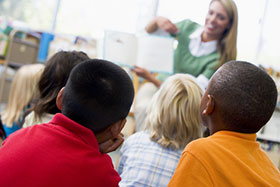I’m often asked, “What can I do to make my students better readers and/or writers?” My answer? Take voice lessons.
 Anyone who has heard a great singer, speaker, or preacher knows the power of voice. It is a unique musical instrument, capable of infusing text with emotion, meaning, and clarity. Tie those gifts to reading aloud and you have the most powerful tool for sharing and teaching literature. Take a course in learning how to use your voice—voice lessons. How to pace yourself, stand, breath, articulate, phrase the text. Simple stuff, but powerful. Teachers, hire a voice coach for a three-hour lesson. Your students will love you even more. Over the years I have heard many a tale of a “favorite teacher.” More often than not, the favorite teacher “read to us aloud.”
Anyone who has heard a great singer, speaker, or preacher knows the power of voice. It is a unique musical instrument, capable of infusing text with emotion, meaning, and clarity. Tie those gifts to reading aloud and you have the most powerful tool for sharing and teaching literature. Take a course in learning how to use your voice—voice lessons. How to pace yourself, stand, breath, articulate, phrase the text. Simple stuff, but powerful. Teachers, hire a voice coach for a three-hour lesson. Your students will love you even more. Over the years I have heard many a tale of a “favorite teacher.” More often than not, the favorite teacher “read to us aloud.”
To read to students—kindergarten on up—is to instill vocabulary, grammar, narrative structure, and meaning to words. It will make the art of reading emotional. Kids who are constantly read to will think, speak, and write better. Those of you determined to score higher in tests will get better test results if you read to the kids—every day. Parents who read to their kids—everyday–develop great psychological and emotional bonding.
Choose books that make you laugh, cry, and feel deeply. Your students will laugh, cry, and feel deeply right along with you—and they will love reading.
4 thoughts on “Voice Lessons”
SOOO true! Read aloud became my favorite teaching tool especially as I got better and better at it, but I started out ahead because of my theater and musical background. My husband wants me to record myself reading a few of the favorites I have shared with him. My fondest memories from school are the books my 6th grade teacher read to us. I have no recollection of other teachers except in 1st grade reading to us and am positive 3, 4, and 5 did not. This was in the 50s. I still remember The Twenty One Balloons and “The Most Dangerous Game” and loving it. (I was a meek and mild, nerdy little girl, too.)
Kids adore listening to the books and if you make use the book as a teaching tool in a good way, it bonds the classroom. We keep referring to “what would XYZ character do or think about this” during the school year. Thanks for this!!! I hope in the CCLS era teachers do not neglect this. I think it is a hugely important piece of great literacy teaching.
Bravo! You say it all. Nothing, nothing, is more important than reading out loud.
I started using poetry in the last 10 years of my teaching. Learning poems by heart is something I stumbled on because the children showed me they wanted to do it, loved it and thought it was fun. It was something that had great educational benefits to that I realized as I added more each year. You can catch a snippet of what it is on youtube search for Janet Poetry on Parade. Keep in mind this poetry recital clip is only the very end result of a year sharing words and ideas and bonding with poetry in addition to the read alouds. The poetry piece does not take much class time and the kids love it. My students learn over 40 poems by heart in the year with no pressure or test or homework or requirement to participate. Then it transfers to their writing. It is a immersion approach because we do poetry from day one, regularly, though randomly, throughout the year. Reciting poetry aids public speaking and reading aloud skills, because you eventually can think about each word, each pause and it is a (generally) short amount of text. It still amazes me that kids can do this so easily. I am trying to spread the idea especially in the age of the CCLS.…which in its infancy may worry teachers because of the testing fears.….
I wish many more teachers would do just what you are doing. Terrific!